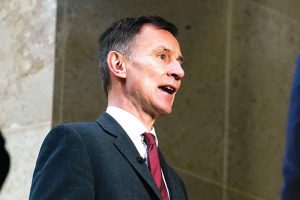Bloomberg
UK Chancellor of the Exchequer Jeremy Hunt has as much as £30 billion ($36 billion) for short-term giveaways in next month’s budget after the public finances came in far better than expected in January.
Borrowing since the fiscal year that began in April is running £22 billion below the level forecast by the Office for Budget Responsibility in November, the Office for National Statistics reported Tuesday. The undershoot is £30.6 billion when differences over student loans are excluded.
That came after the Treasury received £5.4 billion more in tax revenue than it spent in January alone thanks to buoyant income tax revenue and lower debt-interest costs than had been forecast. The OBR was predicting a surplus of just £400 million for the month.
The monthly figure came as a surprise to economists, who had forecast a large shortfall in line with original guidance from the OBR. The fiscal watchdog on Monday issued a revised profile. The pound initially eased following the announcement, falling to the day’s low against the dollar, while UK gilts fell.
The better-than-expected backdrop for the public finances may fuel tensions between Hunt and lawmakers in the ruling Conservative Party who want Hunt to cut taxes significantly to help struggling families, revive the economy and boost their electoral fortunes.
KPMG UK estimated the Treasury has £30 billion more wiggle room in the March budget than it had expected, “which could tempt the chancellor to offer a pay increase to public sector workers, hoping to prevent another wave of strikes,†its economist Michal Stelmach said.
Isabel Stockton, a senior research economist at the Institute for Fiscal Studies, said the “good news for the chancellor is that we can expect lower-than-expected spending on debt interest to persist, and the cost of the expensive energy support schemes also to end up lower than forecast. The latter will only represent a short-term saving for the exchequer.â€
The chancellor has ruled out big tax cuts and refused to bow to union demands on pay. He insists his priority is delivering on a government pledge to cut inflation in half this year.
“With debt at the highest level since the 1960s, it is vital we stick to our plan to reduce debt over the medium-term,†Hunt said in a statement. “Getting debt down will require some tough choices, but it is crucial to reduce the amount spent on debt interest so we can protect our public services.â€
January normally sees a large surplus as income tax payments become due. However, this year’s surplus was much lower than the £12.5 billion reported in January 2022. Spending was pushed up by the fiscal consequences of the fastest inflation in decades.
Self-assessed income tax receipts were £21.9 billion in January. That was the highest January figure since monthly records began in April 1999 and a third higher than the same month a year ago.
Also helping the January figures were lower than expected debt interest payments. Even so, they cost £6.7 billion in the month, the highest January figure since monthly records began in April 1997.
So far this fiscal year, debt interest payments have risen by 57% to £95.6 billion — the most on record. Around a quarter of all government bonds are tied to the Retail Prices Index, which has jumped more than 13% over the last year.
The government is also absorbing huge expenses to support households and firms through the cost-of-living crisis.
The UK in January spent about £10 billion on energy support programs, while there were also large one-off payments relating to historic customs duties owed to the European Union.
 The Gulf Time Newspaper One of the finest business newspapers in the UAE brought to you by our professional writers and editors.
The Gulf Time Newspaper One of the finest business newspapers in the UAE brought to you by our professional writers and editors.
